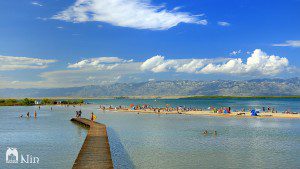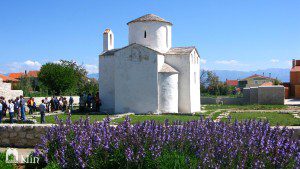Nin is the oldest Croatian royal city and the cradle of Croatian culture. Nin has a history of 3000 years and was founded by the Illyrian tribe Liburni in the 9th century BC under the name Aenona.
The old town core is located on a small island in the middle of a shallow lagoon. In Nin you will see the Church of the Holy Cross, called the smallest cathedral in the world, the Coronation Church of St. Nicholas, one of the most beautiful beaches in the world, a salt pan, medicinal mud and other sights and attractions.
The area of the City of Nin is located in the NW part of Zadar County and in the NW part of Ravni Kotari, and the City of Nin itself is about 15 km from Zadar. The city center is an island, 500 m in diameter, connected to the mainland by two bridges, and was created on a sandbar where the Miljašić Jaruga River once flowed into the sea.
The following settlements administratively belong to the area of the City of Nin: Nin, Grbe, Ninski Stanovi, Poljica Brig, Zaton and Žerava.
The oldest monument that testifies to the baptism of Croats is the baptismal font of Prince Višeslav of Nin (around 800 AD), which was located in the complex of the parish church of St. Anselm in Nin and is one of the most significant monuments of our national history.
During the time of the Croatian national rulers, Nin became the capital from which they governed the state, as well as an important military and trading port. On June 7, 879, Prince Branimir received a letter from Pope John VIII that marked the formal international recognition of the Croatian state for the first time in history.
In 1409, when Ladislav of Naples, along with Dalmatia, Zadar and other autonomous cities, handed it over to the Venetians in a shameful sale.
Then turbulent times began for the city. In order to prevent it from falling into the hands of the Turks and serving as a fortress for the conquest of Zadar, the Venetians displaced the population of Nin in 1646 and destroyed and burned the city. After this destruction, although attempts were made to rebuild the city, Nin never regained its former importance. After Croatia gained independence, by decision of the Croatian Parliament, Nin was restored to city status in 1997 due to its special historical importance.




